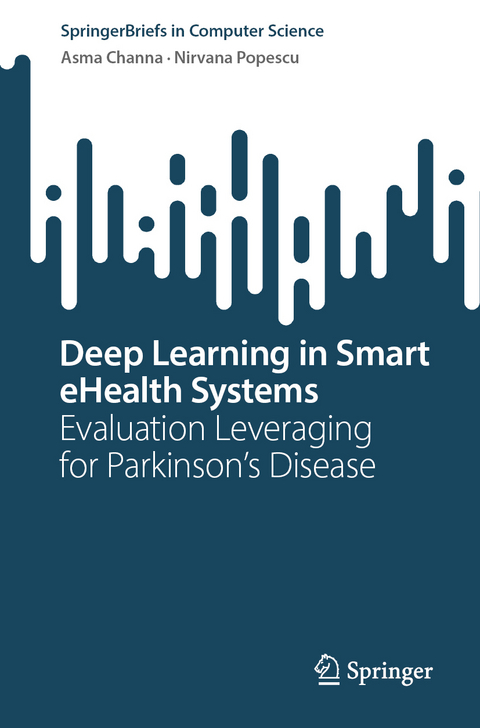
Deep Learning in Smart eHealth Systems
Springer International Publishing (Verlag)
978-3-031-45002-0 (ISBN)
One of the main benefits of this book is that it presents a comprehensive and innovative eHealth framework that leverages deep learning and IoT wearable devices for the evaluation of Parkinson's disease patients. This framework offers a new way to assess and monitor patients' motor deficits in a personalized and automated way, improving the efficiency and accuracy of diagnosis and treatment.
Compared to other books on eHealth and Parkinson's disease, this book offers a unique perspective and solution to the challenges facing patients and healthcare providers. It combines state-of-the-art technology, such as wearable devices and deep learning algorithms, with clinical expertise to develop a personalized and efficient evaluation framework for Parkinson's disease patients.
This book provides a roadmap for the integration of cutting-edge technology into clinical practice, paving the way for more effective and patient-centered healthcare. To understand this book, readers should have a basic knowledge of eHealth, IoT, deep learning, and Parkinson's disease. However, the book provides clear explanations and examples to make the content accessible to a wider audience, including researchers, practitioners, and students interested in the intersection of technology and healthcare.
lt;p>Asma Channa has recently achieved a Double Ph.D. in Computers and Information Technology. She obtained her Master's degree in Electronic Systems Engineering from Mehran University of Engineering and Technology, Jamshoro, Pakistan in 2018, and her Bachelor's degree in Electronics from the same institution in 2015. Her academic pursuits have culminated in a dual doctoral endeavor pursued at the University Politehnica of Bucharest, Romania, and Mediterranea University of Reggio Calabria, Italy. Distinguished as a Marie Sklodowska-Curie Fellow in the prestigious European project A-WEAR, Dr. Channa has made substantial contributions to the fields of wearable technology, eHealth, biomedical signal processing, and artificial intelligence. Her achievements underscore a profound dedication to interdisciplinary research, manifesting her commitment to advancing the frontiers of knowledge at the crossroads of technology and healthcare. With her foundation rooted in extensive academic accomplishments, she remains steadfast in pushing the boundaries of innovation and delivering impactful contributions to the field.
Nirvana Popescu is full professor at University POLITEHNICA of Bucharest (UPB), Computer Science Department, since 2014. She received her Bachelor of Engineering in 1998 at UPB, Computer Science Department, followed by M.Sc at the same department. In 2003, she received her PhD in Computer Science with a thesis titled "Self-organizing intelligent fuzzy systems", at UPB. Meanwhile she worked and studied as PhD guest student at the University of Bielefeld, Germany. Her main research interests are neural networks, intelligent systems, fuzzy logic and control, eHealth systems, cognitive and autonomous robots, reconfigurable computers. At UPB, she is the leader of the Laboratory for "Reconfigurable high-confidence medical devices" and she coordinated research projects in the field of Medical Rehabilitation Robotics and Medical Wearable Sensors.
Unraveling Parkinson's Disease: Diagnostic Challenges and Severity Assessment.- State-of-the-Art: Wearable Devices and Deep Learning Techniques for Parkinson's Disease.- Design and Engineering of a Medical Wearable Device for Parkinson's Disease Management.- Deep Learning Models for Parkinson's Disease Severity Evaluation.- Transforming Parkinson's Disease Care: Cloud Service Empowered by ServiceNow Technology.- Predicting Wearing-Off Episodes in Parkinson's with Multimodal Machine Learning.- Enhancing Gait Analysis Through Wearable Insoles and Deep Learning Techniques.- Conclusion and Prospects for Further Development.
| Erscheinungsdatum | 07.11.2023 |
|---|---|
| Reihe/Serie | SpringerBriefs in Computer Science |
| Zusatzinfo | XIII, 94 p. 35 illus., 33 illus. in color. |
| Verlagsort | Cham |
| Sprache | englisch |
| Maße | 155 x 235 mm |
| Gewicht | 196 g |
| Themenwelt | Informatik ► Theorie / Studium ► Künstliche Intelligenz / Robotik |
| Schlagworte | A-WEAR Bracelet • Cloud Platform • continuous wavelet transform • convolutional neural network • Deep learning • eHealth Systems • feature extraction • Forecasting Parkinson's Disease • Forecasting Parkinson’s Disease • Hidden Markov Model • IoT Wearable Devices for Parkinson's Disease • IoT Wearable Devices for Parkinson’s Disease • ServiceNow Technology • Signal Processing • Support Vector Machine • Tremor Detection • Wearable Devices for Parkinson’s Disease • Wireless Systems for Healthcare |
| ISBN-10 | 3-031-45002-7 / 3031450027 |
| ISBN-13 | 978-3-031-45002-0 / 9783031450020 |
| Zustand | Neuware |
| Informationen gemäß Produktsicherheitsverordnung (GPSR) | |
| Haben Sie eine Frage zum Produkt? |
aus dem Bereich


